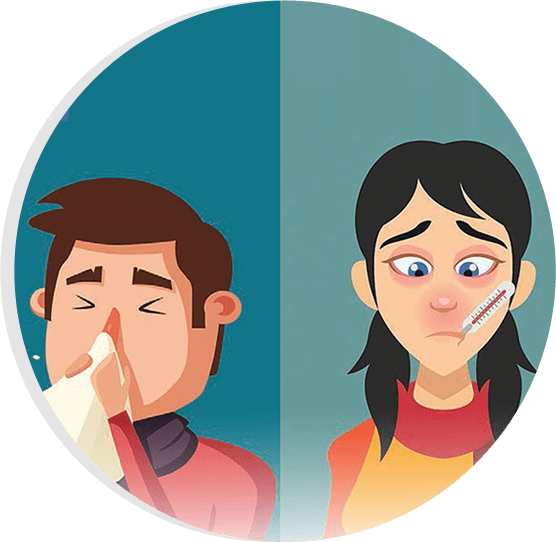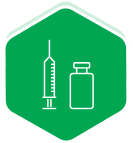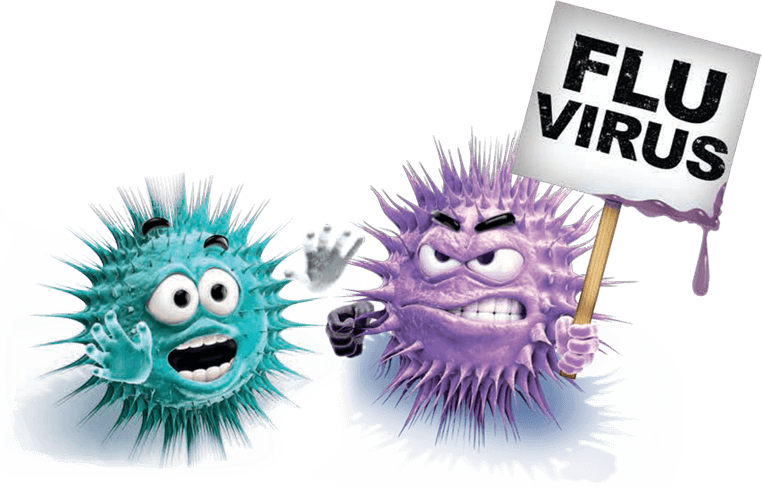What is seasonal influenza (flu)?
Seasonal influenza, also known as the flu, is caused by influenza viruses. It affects the respiratory system, mainly the nose and throat. The effect of seasonal influenza can vary from mild to severe symptoms.
Is it a cold or flu?
Sometimes it can be difficult to tell the difference between a bad cold and flu. Both are respiratory illnesses, but are caused by different types of viruses. The symptoms are almost the same, but are more severe in flu.
The flu can hit anyone, but certain people are more vulnerable and at greater risk of developing complications.

Most common symptoms in flu
- High fever
- Body pains
- Extreme tiredness
- Dry cough
Most common symptoms in common cold
- Headache
- Runny or stuffy nose
How can you prevent the flu?

The seasonal influenza vaccine protects against common viruses that cause the flu. The flu vaccine is updated yearly to include the main viruses causing the flu each year.

Cover the mouth when sneezing or coughing to reduce the spread of flu viruses.

Regular hand washing and sanitation help in reducing the chances of becoming infected.
How dangerous is the flu?
Most people with the flu recover within a few days to 2 weeks of being infected. Others may develop serious health problems such as infections in the lung, ear, sinus and worsening of chronic health problems. The flu can belife-threatening for some. Younger children, older adults and people with chronic health problems are more likely to develop flu complications.
How does the flu spread?
The flu is a very contagious disease. A person may be infected with the flu by inhaling the droplets made when an infected person coughs, sneezes or talks. The flu virus can also be caught from touching a surface or object contaminated with the virus, and then touching mouth, nose or eyes.
Who should be vaccinated?
The vaccine can be given to anyone starting from the age of 6 months. However, the following groups are considered to be at higher risk of getting influenza complications and therefore should take the vaccine:
- Hajj and Umra pilgrims
- All health care workers
- Pregnant women
- Smokers
- All adults aged 65 years and older
People under 65 years of age with high risk conditions such as:
- Taking treatments that weaken their immune system
- like radiation therapy and other treatment for cancer
- Having a damaged or removed spleen
- HIV infection or AIDS
- Chronic alcoholism
- Having long-term health problems (chronic disease):
- Diabetes
- Heart disease
- Chronic lung disease (including Asthma)
- Chronic liver disease
- Kidney failure or kidney disease
- Cancer

Can the flu vaccine give me the flu?
The flu vaccine will not give you the flu because the vaccine contains noninfectious particles of the virus, which merely alert the body to the threat of the virus. They cannot actually cause you to get the flu.
When should I get vaccinated?
You should get vaccinated as soon as the vaccine is available each year. Getting vaccinated once a year will protect you from the flu for the whole year. It takes up to 2 weeks for protection to develop after the shot.
Can the flu vaccine give me the flu?
The flu vaccine will not give you the flu because the vaccine contains noninfectious particles of the virus, which merely alert the body to the threat of the virus. They cannot actually cause you to get the flu.
When should I get vaccinated?
You should get vaccinated as soon as the vaccine is available each year. Getting vaccinated once a year will protect you from the flu for the whole year. It takes up to 2 weeks for protection to develop after the shot.

